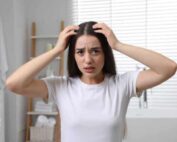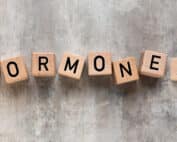What to do When You Recognize the First Signs of Menopause. When your menstrual cycle stops for a year, this is menopause. However many women whose periods stop for a few months want to know if this is the one of the first signs of menopause. Irregular, heavy or missed periods are the first signs of approaching menopause that is known as perimenopause.
Mood swings are one of the first signs of menopause. This also occurs during perimenopause, which can occur for as long as 10 years prior to the onset of menopause. Hormones fluctuate during perimenopause and drop to low levels during menopause. Estrogen gives you energy and progesterone is calming. Lack of these hormones can make a woman feel anxious or depressed. Testosterone will drop in most women and the decline of this hormone may make women feel less confident, more sensitive and decrease libido. While hormone replacement therapy is effective, diet, exercise, sleep and nutrition also play a role in alleviating these symptoms.
Hot flashes and night sweats are the best known first signs of menopause. Lower estrogen is largely responsible for hot flashes and hormone replacement therapy can alleviate these symptoms. Keep in mind that other factors such as food sensitivities, sugar, alcohol and stress can have a profound impact on the intensity and frequency of these symptoms. Try either black cohosh or Rhapontic Rhubarb (Rheum rhaponticum L.) Root Extract. A holistic approach to managing the first signs of menopause is the most successful.
Skin Changes such as dryness, sagging, thinning and/or itching may be one of the first signs of menopause in some women. Estrogen affects skin thickness, wrinkle formation, skin moisture and collagen formation. Hormone replacement therapy with estrogen has been shown to increase collagen, skin thickness and elasticity. Topical facial creams with Estriol, a weak form of estrogen has been shown to be safe and effective. It can also be given in the vagina to alleviate painful intercourse and restore lubrication and elasticity to these delicate tissues.
Weight gain is a big complaint and what most women complain about as one of the first signs of menopause. It becomes more difficult to lose weight after menopause. These symptoms also start in perimenopause. When estrogen is too high or too low, weight gain occurs. Hormones need to be in balance to lose weight. Eating a diet low in sugar, starch, processed foods, gluten and simple carbohydrates can help. Eat plenty of vegetables in every color of the rainbow. They are nutritious and filling as well as low in calories.
Fatigue can be one of the first signs of menopause. Progesterone is a calming hormone that is metabolized into a substance that acts on receptors for GABA, a calming neurotransmitter. Lack of progesterone can make falling and/or staying asleep difficult. Night sweats and hot flashes from low estrogen and a poor diet can awaken women and lack of sleep and ongoing stress from hormone fluctuations contributes to ongoing fatigue. Getting a good night’s sleep is imperative. Try calming herbs such as chamomile, valerian, passion flower and hops. If you have a lot of stress, phosphatidylserine is a phospholipid that lowers the stress hormone cortisol. Cortisol contributes to belly fat and this supplement can help.
Forgetfulness may be one of the first signs of menopause. Lack of sleep and stress contributes to this. Estrogen has been found to play a role in preserving memory. However, managing stress and eating a diet low in sugar, starch and processed foods and high in Omega 3 fats can be extremely helpful. Pregnenolone is an over the counter hormone that is useful for memory. Be sure to measure its effects on your other hormones.
Women can experience mild to severe symptoms, none, some or all. It is important to recognize the first signs of menopause and manage the contributing factors. When sleep, stress management, diet, exercise and supplements don’t help, consider bioidentical hormone replacement therapy by an anti aging functional medicine doctor.





She is a recognized and award-winning holistic, functional, integrative and anti-aging healthcare practitioner, speaker and author, and has been featured in ABC News, Forbes, WOR Radio and many media outlets to spread the word that you can live younger and healthier at any age.